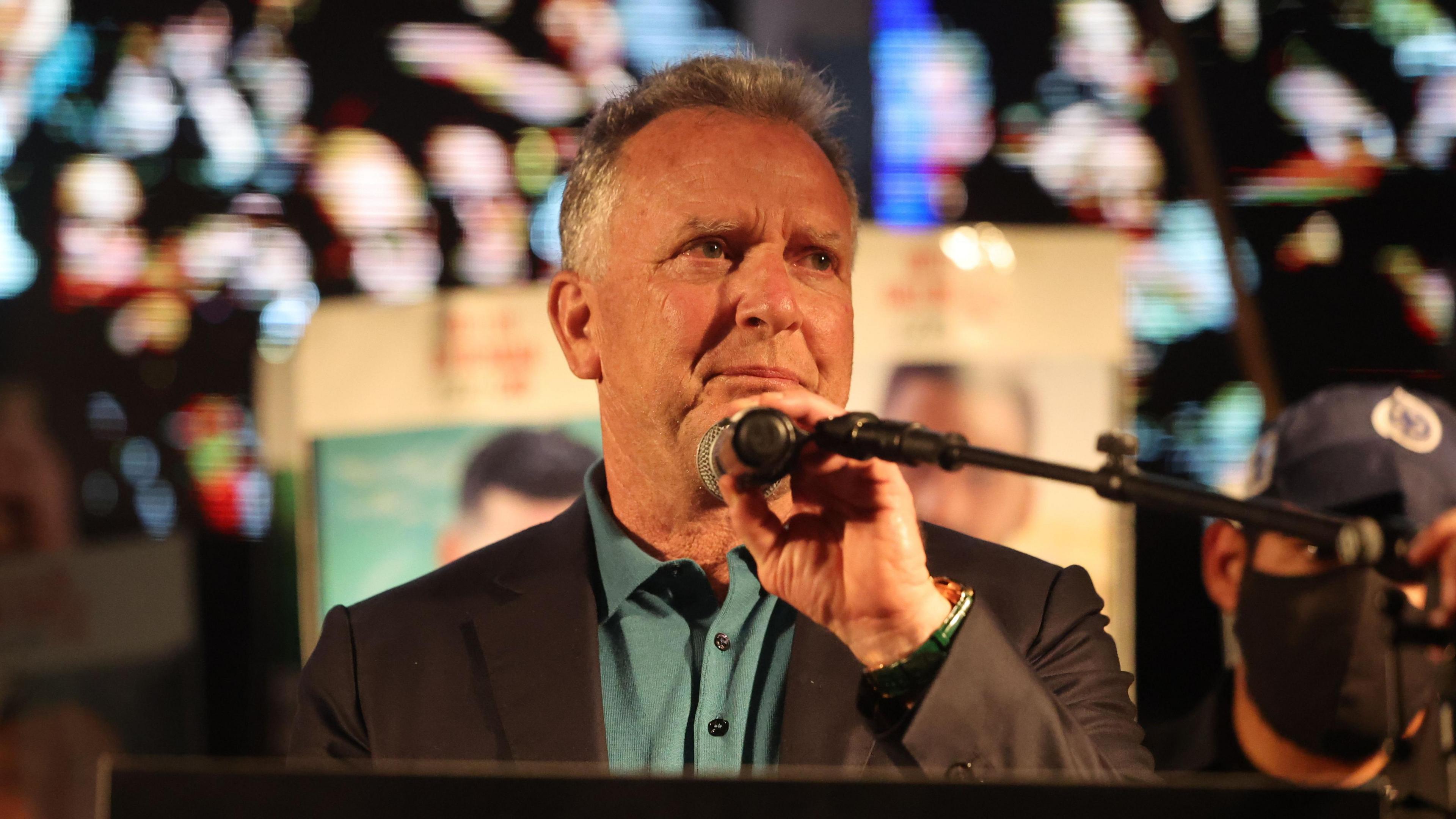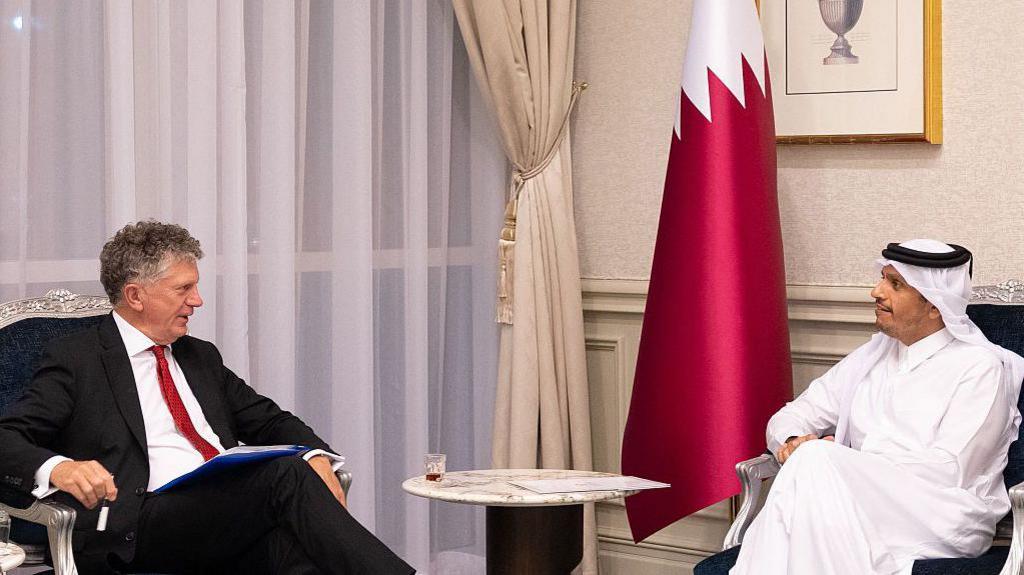Witkoff praises PM aide's 'tireless efforts' on Gaza

Steve Witkoff (pictured) praised UK National Security Adviser Jonathan Powell's "incredible input and tireless efforts"
- Published
The US Middle East envoy Steve Witkoff has praised the "incredible input and tireless efforts" of the UK's National Security Adviser Jonathan Powell in bringing about the ceasefire in Gaza.
Witkoff also wrote on social media that he wanted to "acknowledge the vital role of the UK in assisting and co-ordinating efforts that have led us to this historic day in Israel".
The comments sharply contrast with those of US ambassador to Israel Mike Huckabee, who said a British minister was "delusional" for suggesting the UK played a "key role" in the process.
The specific and personal praise for Powell from Witkoff is a boost to the national security adviser at a moment of political vulnerability.
Powell is facing pressure over what role he played in the collapsed court case against two men accused of spying for China.
Sources in government had for some time been emphasising the strength of the relationship between Powell and Witkoff, with the two men said to be in almost daily contact.
Their relationship has become closer through their work on the Russian invasion of Ukraine, with Powell playing an instrumental role in trying to rebuild the US-Ukraine relationship after US President Donald Trump and his Ukrainian counterpart Volodymyr Zelensky's Oval Office confrontation in February.
Powell was also in Egypt last week as negotiations over the ceasefire were being finalised.
Israel and Hamas went on to agree to the first phase of Trump's ceasefire deal for Gaza, after more than two years of war in the Palestinian territory - though negotiations on latter phases, which include some key issues of contention, are still to come.
Some in government expect Powell's experience of negotiating the Good Friday Agreement in Northern Ireland to be called upon by the US and others in the coming weeks and months, especially on the issue of decommissioning weapons in Gaza.
Education Secretary Bridget Phillipson told Sky News on Sunday that the UK had been involved in "complex matters of diplomacy" and "played a key role behind the scenes" in shaping the plan to bring a halt to fighting and a return of the remaining hostages in Gaza.
Huckabee wrote on X in response: "I assure you she's delusional. She can thank Donald Trump anytime just to set the record straight."
Israel's Deputy Foreign Minister Sharren Haskel added to Huckabee's criticism, arguing that the UK's decision to recognise Palestinian statehood had "actually pushed Hamas to embolden their position".
However, on Monday, Witkoff publicly lauded the UK's involvement and specifically the role of Jonathan Powell.
Asked about his praise, Conservative leader Kemi Badenoch said: "I was not born yesterday.
"I think it is actually very sad that the government is having to beg people to send tweets to say something nice about Jonathan Powell.
"I think that that is quite tragic, the way that the UK's reputation is falling under this Labour government."
Also on Monday, Prime Minister Sir Keir Starmer travelled to the Egyptian city of Sharm el-Sheikh, where Trump and negotiators from Egypt, Qatar and Turkey signed the agreement.
Palestinian President Mahmoud Abbas, who heads the Palestinian Authority in the West Bank, also attended the international summit along with world leaders from around 20 countries.
The ceasefire brokered by Trump began on Friday, with the remaining 20 living hostages held by Hamas in Gaza since its 7 October 2023 attack on Israel being released on Monday.
Hamas is due to hand over the remains of up to 28 deceased hostages. Israel has said it has received the coffins of four dead hostages so far.
In return, Israel has released 250 Palestinian prisoners and 1,700 detainees from Gaza, while increased amounts of aid should enter the territory under the terms of the deal.
Sir Keir said he had "full confidence" in Powell, adding: "He is doing an excellent job. You heard what Steve Witkoff said about him today in relation to the role he has played behind the scenes."
On the plan, the prime minister also said the challenge going forward was its implementation.
"What happens tomorrow really matters, and that's why what I've been discussing with leaders all day is: what part can we play?"
Sir Keir said the UK could play a part in monitoring the ceasefire - despite his home secretary already saying British troops would not be involved in a multinational peacekeeping force there - as well as decommissioning Hamas's weaponry.
"It's really important we keep that focus. We mustn't have any missteps now."

Powell (left) met Qatar's Prime Minister and Foreign Minister Mohammed bin Abdulrahman bin Jassim Al-Than (right) in September
Sir Keir appointed Powell as his national security adviser in November last year, who took over from Sir Tim Barrow.
The holder of the post is always appointed by the prime minister but is normally a civil servant. Powell, in contrast, is a special adviser - a political appointee whose wages are paid by taxpayers.
Powell was instrumental in brokering the 1998 peace deal in Northern Ireland when he was chief of staff to then-Prime Minister Sir Tony Blair.
He left Downing Street after 10 years and went on to set up Inter-mediate, a conflict resolution charity which has helped negotiate peace agreements in Colombia, Mozambique and Spain.
Bronwen Maddox, director of the international relations think tank Chatham House, told BBC Radio 4's Profile that Powell made the case that to achieve peace people had to talk to their enemies "even if they have blood on their hands".
Talking previously about the process of negotiation, Powell has said: "It's much harder to kill people when you know them.
"You have to get to know people and build a relationship of trust to break out of the cycle of violence."